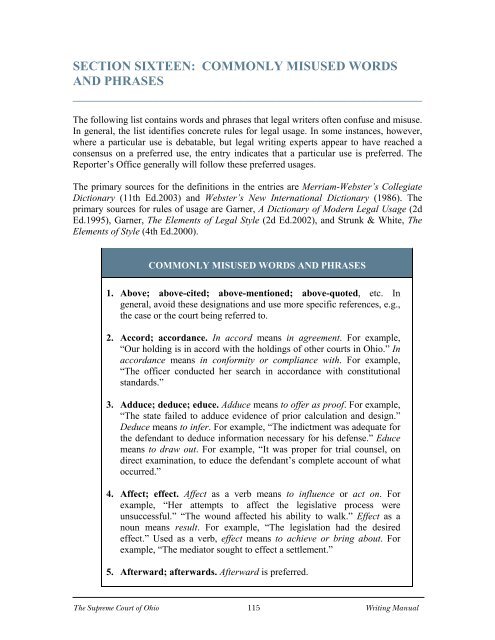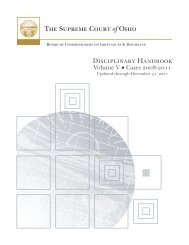WRITING MANUAL - Supreme Court - State of Ohio
WRITING MANUAL - Supreme Court - State of Ohio
WRITING MANUAL - Supreme Court - State of Ohio
You also want an ePaper? Increase the reach of your titles
YUMPU automatically turns print PDFs into web optimized ePapers that Google loves.
SECTION SIXTEEN: COMMONLY MISUSED WORDS<br />
AND PHRASES<br />
______________________________________________________<br />
The following list contains words and phrases that legal writers <strong>of</strong>ten confuse and misuse.<br />
In general, the list identifies concrete rules for legal usage. In some instances, however,<br />
where a particular use is debatable, but legal writing experts appear to have reached a<br />
consensus on a preferred use, the entry indicates that a particular use is preferred. The<br />
Reporter’s Office generally will follow these preferred usages.<br />
The primary sources for the definitions in the entries are Merriam-Webster’s Collegiate<br />
Dictionary (11th Ed.2003) and Webster’s New International Dictionary (1986). The<br />
primary sources for rules <strong>of</strong> usage are Garner, A Dictionary <strong>of</strong> Modern Legal Usage (2d<br />
Ed.1995), Garner, The Elements <strong>of</strong> Legal Style (2d Ed.2002), and Strunk & White, The<br />
Elements <strong>of</strong> Style (4th Ed.2000).<br />
COMMONLY MISUSED WORDS AND PHRASES<br />
1. Above; above-cited; above-mentioned; above-quoted, etc. In<br />
general, avoid these designations and use more specific references, e.g.,<br />
the case or the court being referred to.<br />
2. Accord; accordance. In accord means in agreement. For example,<br />
“Our holding is in accord with the holdings <strong>of</strong> other courts in <strong>Ohio</strong>.” In<br />
accordance means in conformity or compliance with. For example,<br />
“The <strong>of</strong>ficer conducted her search in accordance with constitutional<br />
standards.”<br />
3. Adduce; deduce; educe. Adduce means to <strong>of</strong>fer as pro<strong>of</strong>. For example,<br />
“The state failed to adduce evidence <strong>of</strong> prior calculation and design.”<br />
Deduce means to infer. For example, “The indictment was adequate for<br />
the defendant to deduce information necessary for his defense.” Educe<br />
means to draw out. For example, “It was proper for trial counsel, on<br />
direct examination, to educe the defendant’s complete account <strong>of</strong> what<br />
occurred.”<br />
4. Affect; effect. Affect as a verb means to influence or act on. For<br />
example, “Her attempts to affect the legislative process were<br />
unsuccessful.” “The wound affected his ability to walk.” Effect as a<br />
noun means result. For example, “The legislation had the desired<br />
effect.” Used as a verb, effect means to achieve or bring about. For<br />
example, “The mediator sought to effect a settlement.”<br />
5. Afterward; afterwards. Afterward is preferred.<br />
The <strong>Supreme</strong> <strong>Court</strong> <strong>of</strong> <strong>Ohio</strong> 115 Writing Manual
















